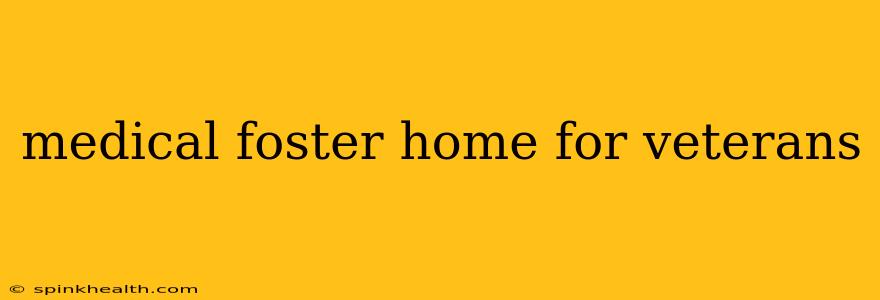The transition from military service to civilian life can be incredibly challenging for many veterans. Physical injuries, PTSD, traumatic brain injuries, and other mental health conditions can leave individuals struggling to navigate daily life. For those facing significant health challenges, a traditional rehabilitation center might not always be the ideal solution. This is where medical foster homes for veterans step in, offering a unique and personalized approach to care. Let's delve into what makes these homes so special and explore the benefits they provide.
What is a Medical Foster Home for Veterans?
Imagine a comfortable, home-like setting where veterans receive personalized medical care and support within a family-like environment. That’s essentially what a medical foster home offers. Unlike institutional settings, these homes provide a smaller, more intimate atmosphere, fostering a sense of belonging and community. Highly trained and compassionate caregivers, often licensed nurses or certified medical assistants, provide 24/7 care tailored to the individual needs of each veteran. This attentive care can range from medication management and wound care to emotional support and assistance with daily living activities.
How Do Medical Foster Homes Differ from Traditional Nursing Homes?
The core difference lies in the environment and the level of personalization. Traditional nursing homes, while providing essential medical care, often feel institutionalized. Medical foster homes prioritize a family-like atmosphere, fostering a sense of community and belonging. The smaller size allows for individualized attention, building strong relationships between caregivers and veterans. This intimate setting can be particularly crucial for veterans struggling with mental health issues, providing a safe and supportive environment conducive to healing.
What Types of Medical Conditions are Addressed in Medical Foster Homes?
These homes cater to a wide range of medical needs. Common conditions addressed include:
- Physical injuries: Amputations, burns, spinal cord injuries, and other physical wounds requiring ongoing care.
- Mental health conditions: PTSD, depression, anxiety, and other mental health challenges that benefit from a supportive environment.
- Cognitive impairments: Traumatic brain injuries (TBIs) and other cognitive difficulties requiring specialized assistance.
- Chronic illnesses: Diabetes, heart conditions, and other chronic illnesses requiring ongoing medical management.
What Kind of Care is Provided in a Medical Foster Home for Veterans?
The care provided is comprehensive and personalized. It typically includes:
- 24/7 medical supervision: Qualified caregivers are present around the clock to provide immediate assistance.
- Medication management: Careful monitoring and administration of medications as prescribed.
- Wound care: Treatment and management of wounds and injuries.
- Personal care assistance: Help with bathing, dressing, eating, and other daily living activities.
- Nutritional support: Assistance with meal planning and preparation to ensure proper nutrition.
- Mental health support: Counseling, therapy, and emotional support to address mental health challenges.
- Rehabilitation services: Physical, occupational, and speech therapy, as needed.
Are Medical Foster Homes for Veterans Covered by Insurance?
The coverage of medical foster home care varies depending on individual insurance plans, veteran benefits (such as VA aid and attendance), and state regulations. It's essential to contact your insurance provider and the VA to determine the extent of coverage available in your specific situation. Often, a combination of private and public funding may be necessary to cover the costs.
How Do I Find a Medical Foster Home for a Veteran?
Finding a suitable medical foster home involves research and careful consideration. You can start by:
- Contacting your local VA office: VA representatives can provide information and resources to help you find appropriate care options.
- Searching online directories: Several online databases list licensed medical foster homes.
- Consulting with healthcare professionals: Doctors and other healthcare professionals can offer recommendations based on the specific needs of the veteran.
Finding the right medical foster home is crucial. It's essential to thoroughly research potential homes, visit the facilities, and speak with caregivers and residents to ensure it's the right fit for the veteran's physical, emotional, and social needs. The goal is to find a nurturing environment that promotes healing, recovery, and a renewed sense of purpose. For many veterans, this intimate, family-like care can be the key to a happier, healthier life.

